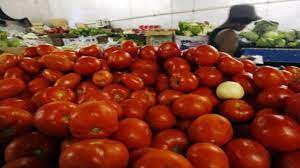Tomato prices have witnessed a significant surge in Delhi-NCR, Noida, UP, and Ghaziabad, causing concern among consumers. The recent increase in prices is attributed to a combination of factors, including rainfall and weather conditions, as reported by the India Meteorological Department (IMD). The soaring prices have impacted households and raised worries about inflation and the overall cost of living.
The inflation alert has sent shockwaves across the region, with tomatoes now being sold at an exorbitant rate of up to Rs. 120 per kilogram. This surge in prices has hit consumers hard, as tomatoes are a staple ingredient in Indian cuisine and widely used in households for various preparations.
Impact of Rainfall and Weather Conditions
The unusual weather patterns, characterized by heavy rainfall and fluctuations in temperature, have had a significant impact on the tomato crop. Excessive rain can damage the crop, affecting its quality and reducing the overall yield. This shortage in supply, combined with increased demand, has led to a steep rise in prices.
Farmers in the affected areas have struggled to cope with the adverse weather conditions, which have hampered the cultivation and harvesting process. The excess moisture caused by rainfall can lead to fungal infections and diseases, further deteriorating the quality of the tomatoes. As a result, farmers are facing challenges in meeting the market demand, leading to a supply-demand gap.
Consumer Concerns and Rising Inflation
The surge in tomato prices has sparked concerns among consumers who rely heavily on this versatile vegetable. Households have been forced to revise their grocery budgets to accommodate the increased cost of tomatoes. The rise in tomato prices also has a cascading effect on the prices of other commodities, as tomatoes are an essential ingredient in many food products.
Furthermore, the inflationary impact of rising tomato prices extends beyond the kitchen. Restaurants, food vendors, and small eateries are grappling with the increased cost of tomatoes, which ultimately affects the prices of the dishes they serve. This creates a burden on businesses and puts pressure on them to pass on the increased costs to consumers.
Government Measures and Mitigation Strategies
Recognizing the severity of the situation, the government is taking measures to address the issue of rising tomato prices. Efforts are underway to boost tomato cultivation and improve the infrastructure for storage and transportation. The government is also exploring options to import tomatoes from neighboring states to bridge the supply-demand gap.
Additionally, initiatives are being implemented to promote alternative crops and diversify agricultural practices. By encouraging farmers to cultivate a range of vegetables, the government aims to reduce dependence on a single crop and create a more resilient agricultural sector.
In conclusion, the surge in tomato prices in Delhi-NCR, Noida, UP, and Ghaziabad has raised concerns among consumers and highlighted the impact of weather conditions on agricultural produce. The combination of heavy rainfall, fluctuating temperatures, and supply-demand dynamics has led to a shortage of tomatoes, resulting in inflated prices.
As consumers grapple with the increased cost, the government is undertaking measures to mitigate the situation and promote sustainable agricultural practices.

























